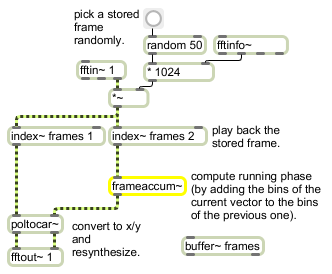Examples

frameaccum~ computes the running phase between frames of spectral data
Compute "running phase" of successive phase deviation frames
| Name | Type | Opt | Description |
|---|---|---|---|
| phasewrap-flag (0 or nonzero) | int | opt | A non-zero integer argument will cause the accumulated values to be wrapped between -π and π. This optional feature is to reduce roundoff error when using frameaccum~ to accumulate phase values. When the argument is set to one. frameaccum~ object performs a phase warping (like the phasewrap~ object). It is more efficient to use the non-zero argument than to use a combination of frameaccum~ and phasewrap~ objects. |
| signal | The input to be accumulated. |

| Name | Description |
|---|---|
| framedelta~ | Compute phase deviation between successive FFT frames |
| MSP Tutorial 26: Frequency Domain Signal Processing with pfft~ | MSP Tutorial 26: Frequency Domain Signal Processing with pfft~ |